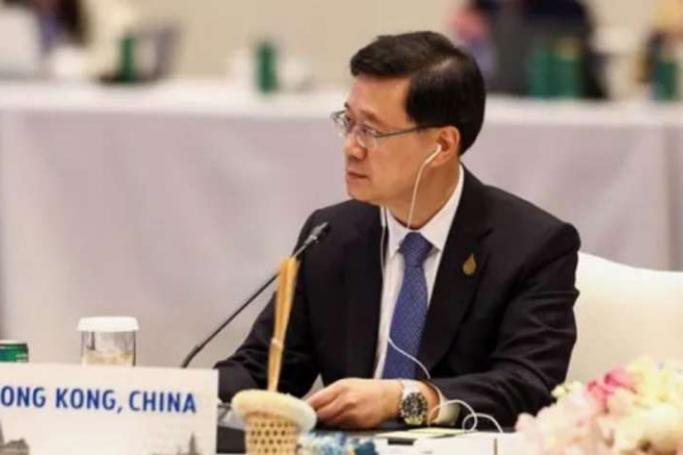Hong Kong leader John Lee said Wednesday the semi-autonomous city would create its own national security law in 2024, four years after Beijing imposed sweeping legislation aimed at silencing dissent.
In a three-hour-plus policy address, the Beijing-anointed leader unveiled measures aimed at revitalising Hong Kong's Covid-ravaged economy and flagging population growth, while asserting the need to protect the Chinese city from "external forces".
"Some countries are undermining China and the implementation of 'one country, two systems' in Hong Kong for their own benefits," he said, referring to the governance model agreed by Britain and China under which the city would keep some autonomy and freedoms following the 1997 handover.
"External forces continue to meddle in Hong Kong affairs," he said.
"We must guard against those seeking to provoke conflict... and remain alert to acts of 'soft resistance' in different forms," said Lee, using a phrase that China and Hong Kong officials have started deploying in speeches to denote anti-government actions.
Massive pro-democracy protests rocked the city in 2019, bringing hundreds of thousands of people to the streets to call for greater freedoms and more autonomy from mainland China.
In response, Beijing imposed a national security law with sentences ranging up to life in prison. As of the end of September, 280 people have been arrested and 30 convicted under the security law.
Security chief-turned-leader Lee -- who is under US sanctions for his role in stamping out the protests -- said Hong Kong would "continue to safeguard national security".
"The government is pressing ahead to draw up effective legislative options and will complete the legislative exercise in 2024 to fulfil our constitutional duty," Lee said.
Under the Basic Law -- the city's mini-constitution -- Hong Kong is required to implement its own law combating seven security-related crimes, including treason and espionage.
The task, often referred to as "a constitutional responsibility" by the city's government, has yet to be fulfilled more than 25 years after Hong Kong's return to Chinese rule.
The last legislative attempt in 2003 was shelved after half a million people took to the streets in protest.
Lee told reporters his administration would avoid a repeat of 2003 by "(ensuring) that people will understand what the eventual legislation will do to protect them".
Thomas Kellogg, executive director of the Center for Asian Law at Georgetown University, said the new legislative push was a "deeply disturbing development".
A new homegrown security law "would give the Hong Kong government the chance... to threaten an even broader array of individuals with legal penalties merely for exercising their basic rights," Kellogg said.
Lee also said Hong Kong would "roll out patriotic education to enhance national identity".
His announcement came a day after Beijing passed a law to strengthen "patriotic education" for children and families as "some people are at a loss about what is patriotism", said China's state-run Xinhua news agency.
- Housing and fertility -
Hong Kong -- which in April finally dropped harsh anti-Covid restrictions that left the finance hub isolated -- is "set to... resume growth" this year, Lee said, adding that the first half of 2023 has seen the economy grow 2.2 percent.
He unveiled measures to boost the city's ailing property market amid falling real estate prices, slashing stamp duty by half to 7.5 percent for non-local buyers and Hongkongers buying additional properties.
Hong Kong's "long-standing problem" of subdivided units -- flats divided into small spaces in often dilapidated buildings -- would also be tackled via a taskforce.
The issue of affordable housing remains one of the city's major policy roadblocks and something successive administrations have failed to tackle.
Lee also sounded the alarm on the "persistently low birth rate" in Hong Kong -- which last year recorded its lowest number of births since records began in 1961 -- set against a population that has among the longest life expectancies in the world.
A "one-off cash bonus of $20,000 (US$2,600) for each baby born today or after" will be offered to Hong Kongers or parents who are permanent residents -- a measure that will last for three years.
Researcher Tan Poh Lin said Singapore's experience with using cash gifts to boost the fertility rate "does not provide high confidence" that many families would be convinced.
"Given the size of the cash bonus, few couples are likely to respond by increasing fertility intentions... But it is a supportive gesture that can alleviate some of the upfront costs," said Tan, an assistant professor at the National University of Singapore.












